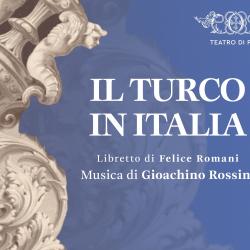
After 26 years from the first and only performance on the Pisa scene, Friday 10 (20.30) and Sunday 12 January (15.30) Teatro Verdi presents The turkish in Italy by Gioachino Rossini in a new production directed by Roberto Catalano and conducted by Hossein Pishkar on the podium of the Orchestra Giovanile Cherubini.
The funny drama in two acts composed by the genius of Pesaro on a libretto by Felice Romani, which had its first performance at La Scala in Milan on 14 August 1814, will be represented with the complicity of scenes and costumes that recreate colorful and lively atmospheres of the 50’s'60: Guido Buganza signs the scenes, Ilaria Ariemme the costumes, Oscar Frosio the lights. The choreography is by Marco Caudera.
The new co-production of the theatres of Pisa, Rovigo, Ravenna, Jesi, Rimini and Novara will bring to the scene appreciated performers of the Rossini repertoire and veterans of the roles: Adolfo Corrado is Selim, the Turkish prince once lover of Zaida and then infatuated with Fiorilla, the soprano Giuliana Gianfaldoni gives voice to Donna Fiorilla, the capricious but honest wife of Don Geronio; this weak and fearful man is played by Marco Bussi, while Francisco Brito is Don Narciso, knight servant of Donna Fiorilla, jealous and sentimental; Francesca Cucuzza is Zaida, Antonio Garès Albazar. The Veneto Opera Choir is taught by Alberto Pelosin, Riccardo Mascia is the Fortepiano Maestro.
Tickets are on sale at the Teatro Verdi box office, via the telephone service (+39 050 941188) and online on www.vivaticket.it.
The first appointment with the Turkish of Rossini is scheduled for Thursday 9 at 18 in the Reduced of the Theatre with the Guide to the Opera, in the usual meeting with the public (admission is free) to deepen through curiosity, stories and listening to songs the knowledge of opera in the poster. Riccardo Mascia, master collaborator and specialist of the Turkish in Italy will lead the presentation.
Masterpiece among the less known and, for many years, even among the less fortunate than Rossini (in modern times it will be redeemed with the legendary edition directed by Gianandrea Gavazzeni with Maria Callas), the Turkish is also conspicuous for having brought to the stage, For the first time in the history of melodrama, metatheatre: the poet Prosdocimo is the one to whom the revelation of theatrical play is entrusted. In search of a good subject, he comes across a group of gypsies and from their adventures draws inspiration for his story. The gypsy Zaida is in Naples because forced to leave her beloved prince Selime Turkey because of slanderous gossip. In the meantime, disguised as a mask, Selim arrives in Naples where he is attracted, reciprocated by Fiorilla, wife of Don Geronio, for this furious. It happens that Selim and Zaida meet again, which triggers Fiorilla’s jealousy. The result is a continuous play of misunderstandings and situations that, in the director’s interpretation, Catalano: "are an expression of a desire pushed to the limits of the need to buy something that you do not yet own. Fiorilla, the character who in the opera seems not to be satisfied with what she has, is the one who wants everything that she knows is desirable for others. What the characters in this world feel is a product to be consumed; nobody, except Zaida and her sincere love for Selim, feels anything authentic".
THE TURKISH IN ITALY
Funny drama in two acts
Booklet Felice Romani
Music Gioachino Rossini
Representative Casa Ricordi, Milan
First performance: Milan, Teatro alla Scala, 14 August 1814
Characters and performers
Selim Adolfo Corrado
Donna Fiorilla Giuliana Gianfaldoni
Don Narciso Francisco Brito
Don Geronio Marco Bussi
Prosdocimo Bruno Taddia
Zaida Francesca Cucuzza
Albazar Antonio Garés
Director
Hossein Pishkar
Regia
Roberto Catalano
Orchestra Giovanile Cherubini
Veneto Opera Choir
Maestro del Coro Alberto Pelosin
Fortepiano Master Riccardo Mascia
New production and installation
Co-production Fondazione Teatro di Pisa, Teatro di Tradizione Dante Alighieri
(Ravenna), Teatro Sociale di Rovigo, Fondazione Teatro Carlo Coccia di Novara,
Pergolesi Spontini Foundation (Jesi), Amintore Galli Theatre (Rimini)